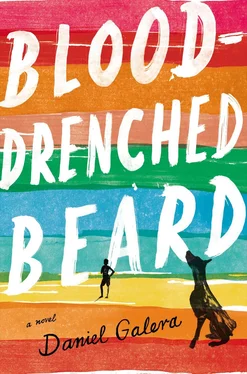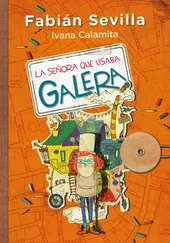He stays in hospital for eleven days.
The morning he is released, he uses the money that Dália brought him to catch a bus to the Florianópolis bus station, where he has lunch and buys a ticket to Garopaba. When he arrives, he goes straight to Dália’s house, although she is still at work in Imbituba. Beta prances about when she sees him, and Dália’s mother says that she gave her a lot of food so she’d regain her weight. She starts relaying another dream she had about him, but he stops her and says he already knows. This time a woman with black hair comes out of a swamp with a child. She stares at him in silence. That’s what you dreamed, right? She nods. You shouldn’t waste your time dreaming about me, ma’am. He downs the last sip of coffee, thanks her for everything several times, and congratulates her on her daughter’s engagement. He promises to return to pay her back for the dog food.
He passes through the middle of the fishing village at dusk, Beta close at heel, with fresh nicks on his face from the nurse who shaved him that morning. He goes into the supermarket and spends the rest of the money in his pocket on bread, butter, coffee, a bunch of bananas, and a credit voucher for his cell phone. Several locals are out on the sidewalks and on the verandas of their homes after the day of sun. Clothes and pillows are being taken in from windows, fences, and clotheslines. The air is filled with the smells of the salty breeze, fish gravy, and corn cakes coming out of the oven. The ocean looks like a stained-glass window in motion, as if the light of the setting sun were coming from underwater and the beach were the inside of a church, but the water smells of oil and sewage. And there, perched on the hill, is the apartment he wanted so badly to live in and did. He opens the shutters to let air into the living room and stays there in the dark until the streetlight in front of his window comes on and casts its light inside. He doesn’t feel like he is returning home. Jasmim was wrong about that. He doesn’t belong here. There are two possible places for a person. Family is one. The other is the whole world. Sometimes it isn’t easy to figure out which one we are in.
After a night of sleep like any other, he wakes up on October 30, 2008, in a dirty, mold-infested apartment, with no money and no job but with no fear either. He phones a laundry service and arranges to have them pick up his dirty clothes. He phones Saucepan, who tells him that at the moment there is no way he can have his old job as swimming instructor back. The new instructor is doing well, and he has no reason to replace him. Besides which, it wouldn’t be fair to the guy. The number of people using the pool has actually picked up a little. He tells Saucepan that it’s not a problem and congratulates him on the success of the gym. Then he goes out for lunch and stops at an ATM to withdraw the last of his savings. He phones Sara and asks if she thinks Douglas would agree to fix his teeth and let him pay the following month, presuming he doesn’t know anything about the day of the barbecue, etc. She calls him back a few minutes later with an appointment time. Back at the apartment, he starts cleaning. He is scrubbing the floor with bleach when he hears someone clapping to get his attention outside the window. He doesn’t recognize the strong, tanned young man smiling at him.
Good afternoon.
Afternoon. Who are you?
Don’t you remember me, Tom Hanks?
He invites the man in.
All I can offer you is cold water.
No problem. I stopped by here a few days ago to see if you’d survived, but the windows were shut. Are you okay?
I’m still a bit weak. I spent a few days in the hospital. I had a bad bout of pneumonia.
Do you remember what happened that day on the beach?
Yep. I fell off a headland near Pinheira in the middle of the storm and swam all night trying to get to a beach.
And you ended up on Siriú? From Pinheira to Siriú?
I guess so. I must have caught a current.
Beta comes through the door and goes to drink water from her bowl.
So that’s the dog you went to get back from the guy.
You hear about it?
Everyone heard about it. They told me not to come and see you.
Huh? Why?
I dunno. People invent stories.
What stories?
The man raises his eyebrows.
Forget it, he says. Tell me something, when’s that course for volunteer lifeguards that you told me about?
End of November. It runs for three weeks. There’s a theoretical component and a practical one. The problem’s the practical component. They put you through the wringer.
But if you pass, you’ll have work all summer?
It starts just before Christmas and goes until Carnival, at least.
How much does it pay?
It’s pretty good. A hundred reais a day. Even counting days off, you bring in over two thousand a month. Did you mean what you said? About giving me a hand with my swimming?
I meant it. But I want to do the course too. Where do you sign up?
At the fire department. Over in Palhocinha.
Great. Just give me a few more days ’cause I’m still a bit weak, but we can start next week. Meet me here at eight in the morning, even if it’s raining, if there’s a northeasterly blowing, whatever. What’s your name?
Aírton. Are you going to charge me for it?
Absolutely not. Take down my phone number.
After Aírton leaves and the laundry lady stops by to pick up his clothes, he takes Beta for a walk along the beach and is still thinking about the course for lifeguards when he remembers a story that was born, lived a long life, and died in his own mind, or at least was dead until now, a story that he had started imagining for no apparent reason when he was about twelve or thirteen and continued imagining until the end of his adolescence. It was just a sketch or daydream that never came to a conclusion worthy of the name but that always began in the same manner. He’d be sitting on the beach looking out to sea, when he’d see someone waving for help out in the deep water. After swimming past the surf, he’d discover that the person drowning was a girl his age, a girl who gradually got older as he imagined the scene year after year. He would pull her out of the sea, and she’d cough up water and lie on the sand, weary and breathless. Sometimes she’d be wearing clothes; other times she’d be in a bikini. Her skin was always very white, her hair always black, straight, and long. Her eyes were blue. She wasn’t anyone he knew or came to know. After recovering enough to stand up and walk, she’d thank him with a hug or just a word and a look, and she’d run off down the beach without looking back, her thin arms swinging, until she disappeared along a path through the dunes. Months would go by, sometimes years. He imagined he was older than he was. These futures varied, but in all of them he’d find the girl again, and she’d be in a terrible state. She had suffered at the hands of men or had become an addict of some sort. A suicide. A wandering orphan. She’d end up crying. Her hair would stick to her cheeks streaked with tears. The slightly older version of himself that was now the protagonist of the story had spent months or years looking for the girl, imagining who she was, how she had come to be out in the deep, where she had gone after disappearing down the beach, and now she reappeared, and he loved her. It was that simple. Nothing easier than loving a nameless girl who was a mere idea, delivered to him by fate, vulnerable and sensuous, ready to be rescued, run away, and reappear. But she hated him. Sometimes she accused him of saving her against her will. Why did you pull me out of the water? You shouldn’t have. More often she would accuse him of abandoning her. How could you have abandoned me? How could you have let me go? But I saved you, he’d argue. She’d shake her head, saying no. Why didn’t you ask my name? Why didn’t you hold my hand? Why didn’t you come running after me? Why did you let me go? You didn’t want me. And to him it all seemed terribly unfair. How was he supposed to have known? He’d done what had to be done. He’d done everything that could have been done. How unfair it was that she could look back after so long and accuse him of not having done something differently at the time. Didn’t she remember running off without a word? Sometimes there was a sexual tension in this conflict, sometimes he felt sheer desperation. It ended in that, in the intrinsic unfairness of the act of looking back, of daring to imagine a past different from the one that had brought him to precisely where he was now. He imagined variations on this story for years on end. In all of them, he ended up alone. It never occurred to him to tell it to someone, write it down, draw it. Why this story? Why any story? Where had it come from, and where had it been all this time?
Читать дальше












